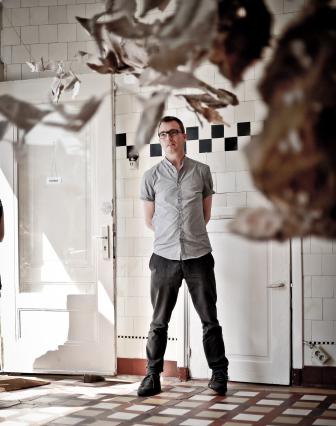Artikel
Editorial: April 2005

18 januari 2006
Hear Michael Longley read a poem for his grandson, watch Don Paterson busk in the streets of Rotterdam, or see Ahmed al-Shahawi blow puffs of smoke from his hookah, whilst reciting in Arabic. These are just three of the poets featured in eight new short films of poets reading their own work, now available on PIW in our
Camera Poetica series.
Or listen carefully to our new Clip of the month (also taken from the new batch), which features Antjie Krog reading a fragment from her longer poem ‘Country of Grief and Grace’:Sometimes, it is in the words of a poet from the other end of the earth that we find the situation back home best described. Krog’s poem, written about her native South Africa, these days brings to mind neighbouring Zimbabwe. But one might also think of a poem by Chinese poet {id="971" title="Sheng Xing"}: "spring is here/ but nothing’s any better". In the first post-election Zimbabwean issue, enigmatic poet {id="5759" title="Kristina Rungano"} shows us life in Zimbabwe, and what it means to be a woman in Zimbabwe in particular, in concise, powerful descriptions – "I bore the great big mud container on my head/ Like a big painful umbrella". Yet equally vivid is her evocation of life as an exile in London, where she presumably still resides:
between you and me
how desperately
how it aches
how desperately it aches between you and me
so much hurt for truth
so much destruction
so little left for survival
where do we go from here
your voice slung
in anger
over the solid cold length of our past
how long does it take
for a voice
to reach another
in this country held bleeding between us
In a new essay in our International magazine, ‘The Best Color in the World’, Ukrainian poet Andriy Bondar presents some strongly political views on the Orange Revolution of last December in his country, views which nevertheless seem to spring directly from his sensibility as a poet. New German poet {id="2216" title="Marcel Beyer"}, on the other hand, is preoccupied in his work with "echoes of the German past between 1933 and 1945 in the present, and the traces of this past in language". How ineffable such traces really are is illustrated by a poem like ‘Dust’:
We held each other close
And looked to the approaching bus
Which we scrambled into
Our jeans scrubbing in the metal railings
Till we found solace in the upper deck
Where herds of cattle might have passed on sand.
Portuguese {id="4640" title="Adília Lopes"}, who calls herself a ‘pop poet’, started her career as a poet by self-publishing her first book, and has subsequently been published only by ‘alternative’ or ‘underground’ presses. The other Portuguese poet published this month, {id="4659" title="Vasco Graça Moura"}, is both a distinguished poet, translator, novelist and "holder of key posts in national cultural institutions". Yet, althoug their poetic attitudes are "diametrically opposed", as our editor Richard Zenith writes, they have a lot in common: intertextuality, a penchant for storytelling and popular culture. To quote Lopes:
(-) What is it, I ask you
sometimes, when I see the cloud of dust, the shadow,
across the clotheslines, the chimney and
then, still shadow, across the aerials.
Dust is in the blue, air, and my
question, dust into the sky, until it’s dark.
Finally, in the Greek magazine this month two of the most important Greek poets of the twentieth century, {id="2459" title="Nikos Engonopoulos"} and {id="2463" title="Titos Patríkios"}. True modern classics, their poetry is accompanied by several scholarly essays. With the World War II and subsequent Greek civil war acting as a major influence on their life and work, it is perhaps no surprise to find Patríkios – who spent several years in prisons and camps, both German and Greek – rejecting "Verses that howl/ verses that rise, as if they’re bayonets". After all, "today no verse topples regimes/ no verse mobilizes the masses." What’s left for the poet to do, however, might prove infinitely more valuable:
the poem speaks of the precipice
where there will be weeping
and gnashing of teeth
and there won’t be Kleenex
or Dr. Abílio Loff
my dear dentist
That’s why I no longer write
in order to offer paper guns
weapons made of babbling, hollow words.
But only to lift up a small corner of the truth
to cast a little light on our counterfeit life.
As much as I can, as long as I endure.
© Corine Vloet
Sponsors





Partners
LantarenVenster – Verhalenhuis Belvédère

